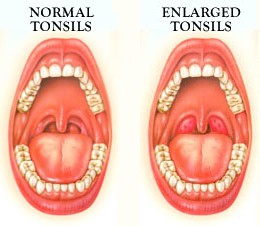Getting tonsils removed (also known as tonsillectomies) is not a new procedure. This has been going on for centuries. People get them removed because they get sick too often, have trouble breathing, or wake up in the middle of the night due to their tonsils and irritation. But is this really a safe procedure? Would it be better just to keep them in?
This study done for Cochrane by Burton MJ, Glasziou PP, Chong L, and Venekamp RP in November of 2014 tested just how safe and effective tonsillectomies really are. This study was a randomized control trial that compared tonsillectomies with non-surgical treatment in adults and children with frequent tonsillitis. They decided to do seven trials. There were 156 adults with two trials and 986 children with 5 trials with low risk of bias. They took this data and decided there was an average of three sore throats with the children, compared to 3.6 in the control group. They also decided there were 3.6 fewer with adults getting surgery within six months after they had surgery.
They concluded that children who get tonsillitis a lot may get a little bit of a benefit from getting them removed. It can avoid .6 more episodes in one year compared to the non-surgical way.
To avoid sore throats, if a child gets them frequently, they will of course benefit more from the surgery. For adults though, the experiment was not enough to tell.
Even the scientists themselves suggested the data was not 100% accurate. They said a lot of the children did not continue with the experiment until the end or ended up in the wrong control group. The adult trial was just not as accurate as it should have been, because once one is an adult, the surgery can be a lot more painful than for a child.
This study could have been done in a better fashion. The children could have signed consent forms to stay throughout the whole trial. They also should have separate studies on children and adults, not within the same experiment. Considering children and adults react differently to this surgery, it would be pointless to test them together. Also, they should have made sure their control groups were in similar health in general before testing them as the same. They did have a good amount of people being tested, the larger number the better.
Another study that is similar that could be done is if one is a child with large tonsils, but is not having problems, should they get them removed just in case of sickness in the future? This is an interesting question. Scientists could take two groups, one of kids with large tonsils getting tonsillectomies and the other of kids with large tonsils who don’t. They are both in good health and continue to be for the next 15 years. Then, when checked on, scientists could check if their health was better from getting the surgery. That could be an interesting experiment to think about.

Works Cited:
- http://www.curemytonsilstones.com
- http://www.newkidscenter.com
- https://www.nlm.nih.gov/medlineplus/ency/article/003013.htm
- http://www.webmd.com/oral-health/news/20110102/new-guidelines-on-when-kids-need-tonsillectomies
- http://www.entnet.org/content/tonsillectomy-facts-us-ent-doctors

Personally i have gotten my Tonsils taken out because they were causing me to get strep throat a few times a year. Since i was in 4th grade and got them removed i have only had strep throat a few times. I think without taking them out i would be much more frequently then i am now. I like that the study you found was randomized control trial because it makes it more reliable. Along with the experts i don’t think this trial was 100% accurate but it is really difficult to make any trial that accurate. This is a case study that is randomized and double blind of the actual surgery of getting your tonsils out because i know you mentioned weather it would be safer to keep them in or go through the surgery. http://www.ncbi.nlm.nih.gov/pmc/articles/PMC3523437/.